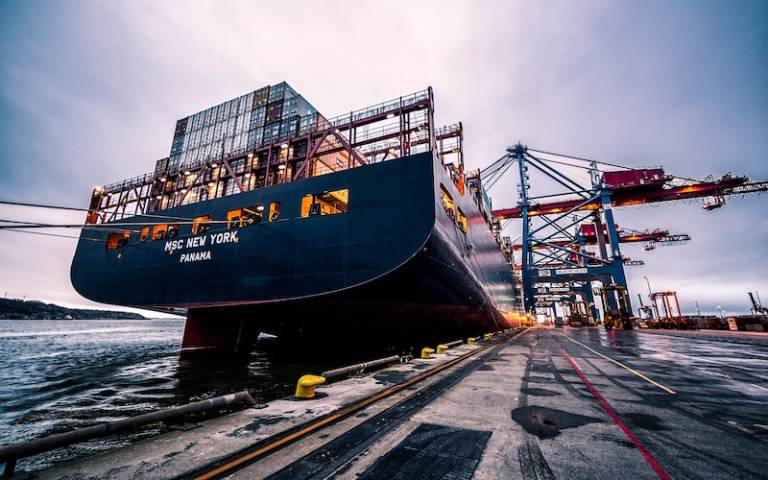New report published on the prospects for the 5%/ 2030 zero-emission fuel target in shipping
17 October 2023
The report finds that shipping needs to take rapid action to achieve 5% zero-emission fuel target by 2030

ATHENS, 18 October – A new report from UMAS, Getting to Zero Coalition, and Race to Zero finds that while it is possible for scalable zero-emission fuels to make up 5% of international shipping fuels by 2030 – shipping’s breakthrough target – the window of opportunity will close soon, and rapid action is required from the industry.
The report, “Climate Action in Shipping, Progress towards Shipping’s 2030 Breakthrough,” paints a mixed picture when it comes to shipping’s core challenges of sourcing zero-emission fuels and deploying zero-emission vessels. Zero-emission fuel production currently in the pipeline could end up covering just a quarter of the fuel needed to deliver the breakthrough. However, if more projects are successful, zero-emission fuel production could be up to twice as much as is needed, even when accounting for other sectors’ fuel needs.
On vessels, the picture is less rosy. Despite headline-grabbing orders for methanol-fuelled ships, continuing the current trajectory of orders might only deliver one-fifth of the needed vessels to achieve the breakthrough target. As Domagoj Baresic, Research Associate at UCL and Consultant at UMAS, and lead author of the report noted:
“The last 12 months have seen a positive shift in maritime decarbonisation efforts. Now is the time to see strong progress in terms of commitment for zero carbon fuels and freight from the industry so that the needed rapid scale-up of these fuels in the energy mix is achieved.
Progress on policy is critical to enabling the needed scale-up of supply and demand. Major progress has been achieved with the adoption of an ambitious greenhouse gas (GHG) emissions reduction strategy by the International Maritime Organization (IMO), which will be followed in 2025 by the adoption of concrete global measures to achieve the strategy’s goals. Because these measures are to be implemented after 2027, industry and national governments will need to make concerted, immediate efforts (e.g., through green corridors and national policy) to stimulate supply and demand in the intervening period and ensure that the industry is prepared to deliver on the IMO strategy before 2030. Nishatabbas Rehmatulla, Principal Research Fellow at UCL, Principal Consultant at UMAS and co-author of the report noted:
“The key message from this work is that there remains insufficient current and future demand (both in terms of vessels and cargo) to match the supply required to be on track with the breakthrough goal. Despite the numerous headline-grabbing announcements for orders dual fuel methanol ships (assuming they actually run on e-methanol) they form a tiny fraction of the overall no. of ships required.
Launched in conjunction with the Global Maritime Forum’s Annual Summit in Athens, the report assesses progress towards the goal of having scalable zero-emission fuels account for 5% of international shipping fuels by 2030. This is the threshold needed to rapidly scale the uptake of such fuels and achieve full decarbonisation by at least 2050. Notably, the recently revised IMO strategy includes a new level of ambition and sets an important target of at least 5% – striving for 10% – uptake of zero or near-zero GHG emission fuels by 2030. James Stewart, co-author of the report, noted:
“The technology to facilitate production, distribution and bunkering of SZEF is progressing well, however the extent of its scale-up throughout the rest of the decade is not guaranteed. To become fully aligned with the 2030 5% breakthrough target, all sectors of the maritime industry must rally around the historic ambitions set out in the 2023 IMO GHG Strategy and work to establish a robust demand base for SZEF, thereby providing producers with the confidence they need to invest in new capacity projects."
Vishnu Prakash, co-author of the report, noted:
“Evidence suggests that clear signals needed for ship owners to make long-term decisions towards sustainable zero-emission fuel-capable vessels with the least amount of commercial uncertainty are still lacking, despite the industry being at a critical juncture where a significant structural shift needs to occur. It is therefore imperative that strong, effective legislation and incentives are rapidly put into place to catalyse the necessary transition.
The report marks a significant milestone on the road to COP28 later this year in Dubai, providing a stocktake of progress. It evaluates the shipping breakthrough goal against five key levers for change: technology and supply; finance; policy; demand; and civil society action. The report indicates that financing for achieving the breakthrough is partially on track, with the amount of shipping finance covered by the Poseidon Principles surpassing US$200 billion and the climate alignment of these investments improving from 4% to 6% on a weighted average basis. The ability of the industry to continue to improve alignment as requirements tighten remains to be seen.
The report team included: Domagoj Baresic, Nishatabbas Rehmatulla, James Stewart, Vishnu Prakash and Tristan Smith. Partners included the Global Maritime Forum, and the UN High Level Champions Race to Zero.
Links:
- Read the report - access the external webpage.
Image credit: pexels.com
 Close
Close

